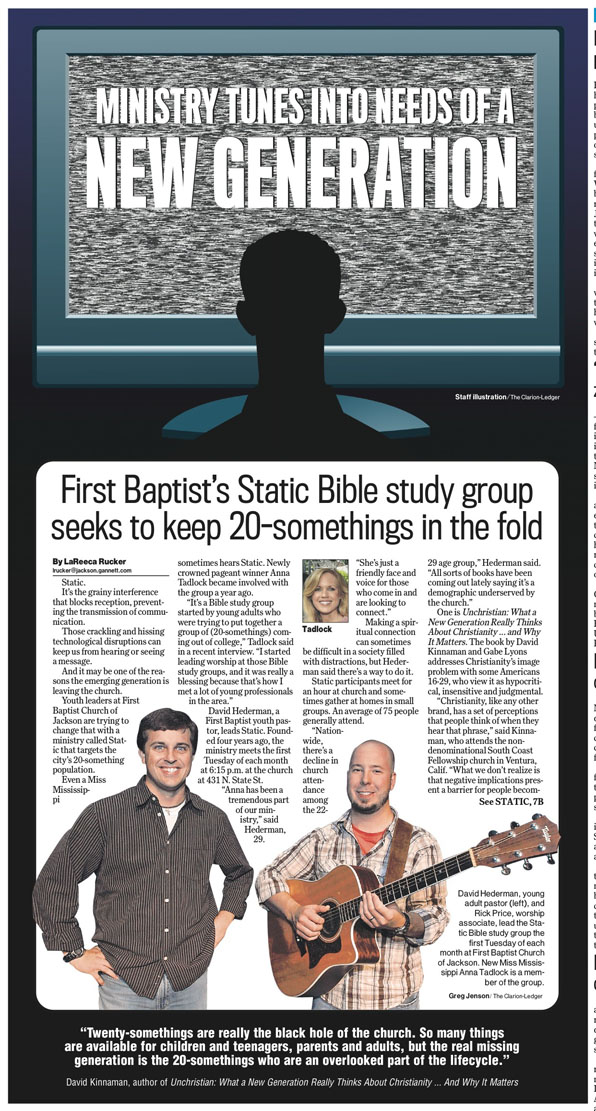Ministry tunes into needs of new generation: First Baptist's Static Bible study group seeks to keep 20-somethings in the fold
LaReeca Rucker
The Clarion-Ledger
Static. It's the grainy interference that blocks reception, preventing the transmission of communication.
Those crackling and hissing technological disruptions can keep us from hearing or seeing a message. And it may be one of the reasons the emerging generation is leaving the church. Youth leaders at First Baptist Church of Jackson are trying to change that with a ministry called Static that targets the city's 20-something population.
Even a Miss Mississippi sometimes hears Static. Newly crowned pageant winner Anna Tadlock became involved with the group a year ago.
"It's a Bible study group started by young adults who were trying to put together a group of (20-somethings) coming out of college," Tadlock said in a recent interview. "I started leading worship at those Bible study groups, and it was really a blessing because that's how I met a lot of young professionals in the area."
David Hederman, a First Baptist youth pastor, leads Static. Founded four years ago, the ministry meets the first Tuesday of each month at 6:15 p.m. at the church at 431 N. State St.
"Anna has been a tremendous part of our ministry," said Hederman, 29. "She's just a friendly face and voice for those who come in and are looking to connect."
Making a spiritual connection can sometimes be difficult in a society filled with distractions, but Hederman said there's a way to do it. Static participants meet for an hour at church and sometimes gather at homes in small groups. An average of 75 people generally attend.
"Nationwide, there's a decline in church attendance among the 22-29 age group," Hederman said. "All sorts of books have been coming out lately saying it's a demographic underserved by the church."
One is Unchristian: What a New Generation Really Thinks About Christianity ... and Why It Matters. The book by David Kinnaman and Gabe Lyons addresses Christianity's image problem with some Americans 16-29, who view it as hypocritical, insensitive and judgmental.
"Christianity, like any other brand, has a set of perceptions that people think of when they hear that phrase," said Kinnaman, who attends the
non-denominational South Coast Fellowship church in Ventura, Calif. "What we don't realize is that negative implications present a barrier for people becoming Christians."
After interviewing Christians ages 16-29 from different denominations and some who weren't religious, Kinnaman found negative perceptions have turned some away from the church.
"Twenty-somethings are really the black hole of the church," he said. "So many things are available for children and teenagers, parents and adults, but the real missing generation is the 20-somethings who are an overlooked part of the lifecycle."
Some churches are paying attention. Jackson's St. Alexis Episcopal Church targets the city's young adult population, and the United Methodist Church in Mississippi has also recognized the importance of the age group. Steve Casteel, connectional ministry director for the United Methodist Church, said the church has established a table that is led by a 20-something convener.
"Their job is to discover ways to empower and serve this age group and youth," he said.
In Static, participants apply biblical principles to issues like the workplace, relationships and fear. Hederman said ministering to members of this age group can be challenging because they are transient and bombarded with new life decisions.
"The transition into adulthood can be pretty lonely," he said. "Talk to anyone in their twenties, and nine times out of 10, they are going to say
they are lonely or isolated. It can even be tough for people who are very socially skilled to meet people and establish a friendship network."
Rich Price, 28, who helps lead Static, said distractions in society "interfere with the voice of God."
"We wanted to cut through that and provide a channel for young people to hear God in a community with other believers," he said. "Despite the fact people in their twenties are very confident and independent, there is a lot of fear they are facing about careers, relationships and whether they'll get married."
Jeannie Waller, 26, became involved with Static after grad school.
"Immediately, you get to plug into people who are walking the same path that you are trying to walk in life,"she said of the group. "You immediately have a bond as Christian brothers or sisters."
Lindsey Webb, 24, who began attending Static meetings after college, said churches must understand generational differences.
"We are more technology savvy," she said. "We are very high-speed, push forward."
Hederman said it's important for churches to know their target audiences.
"What speaks to someone who is 34, married and has children is going to be different than what speaks to someone who is 22, out of school and trying to decide what they are going to do with their life," he said.


